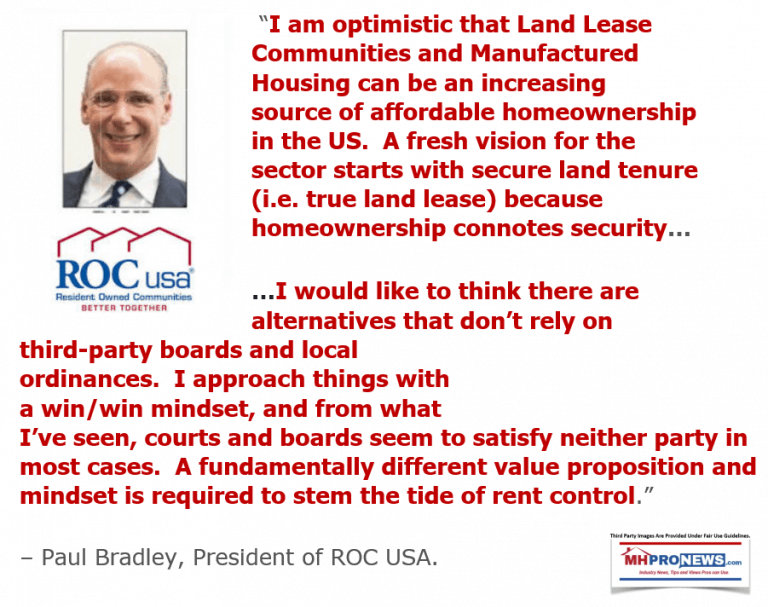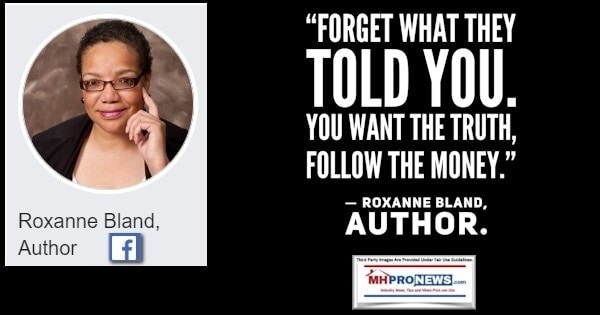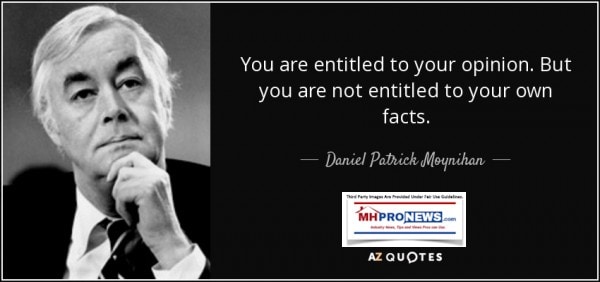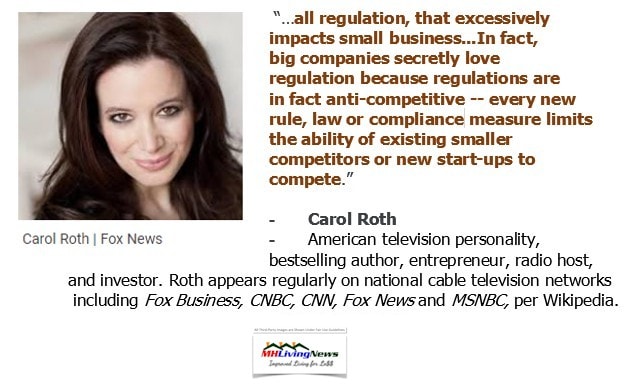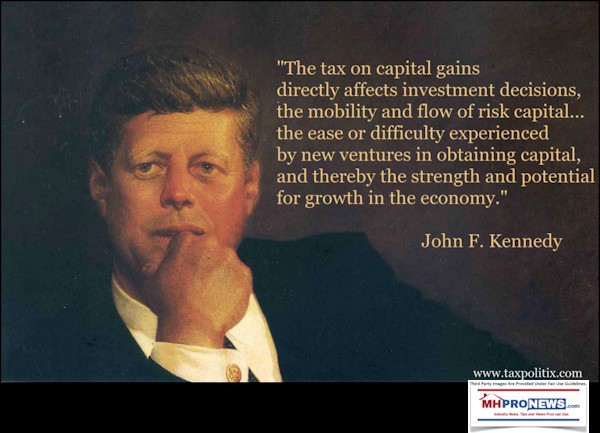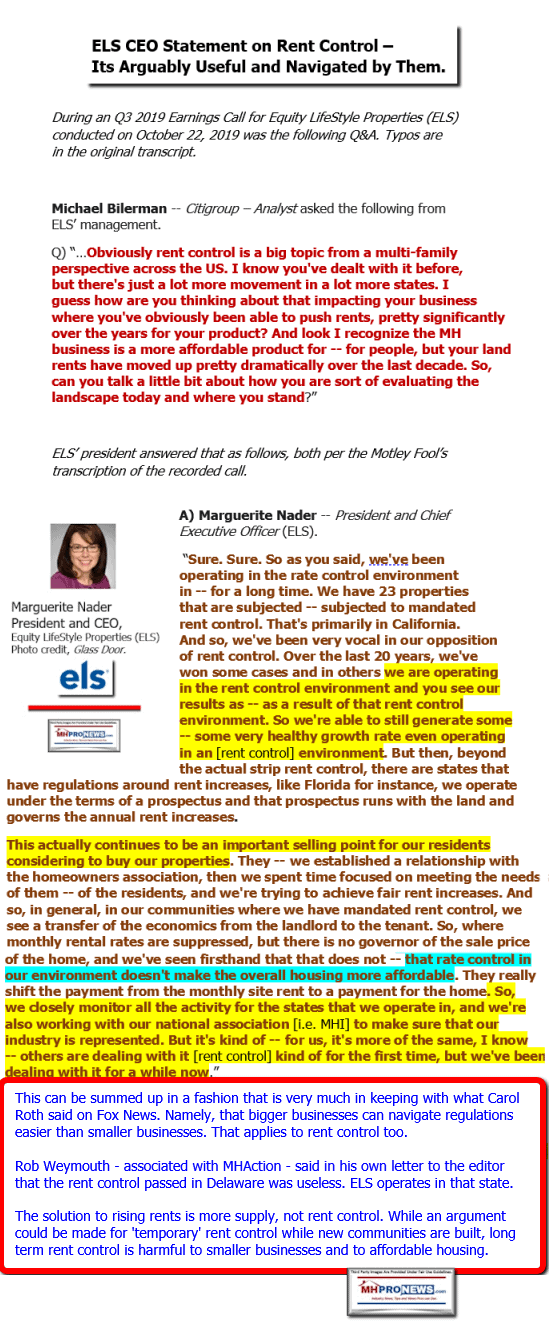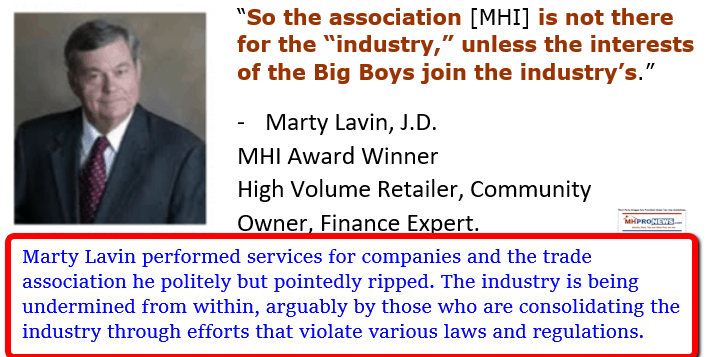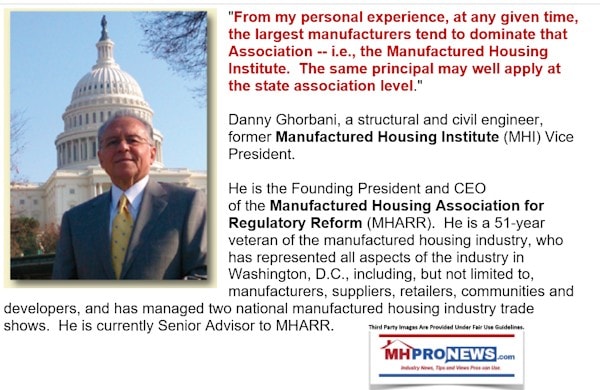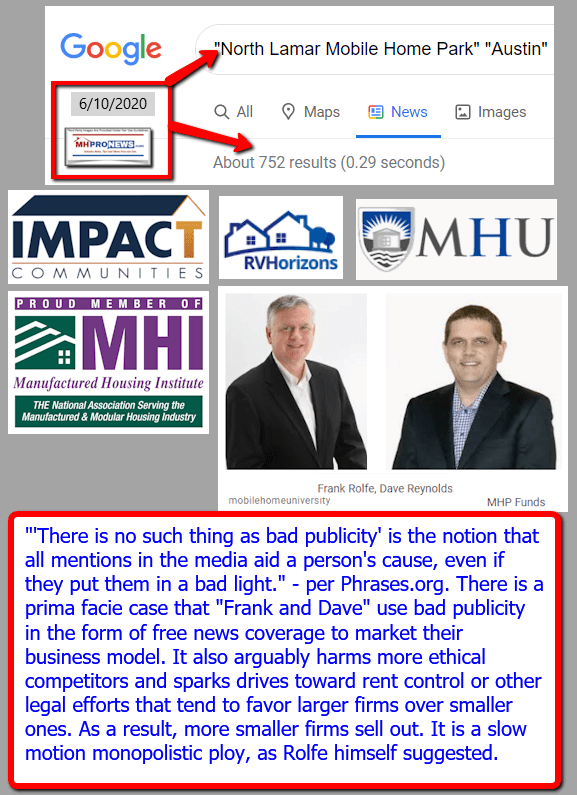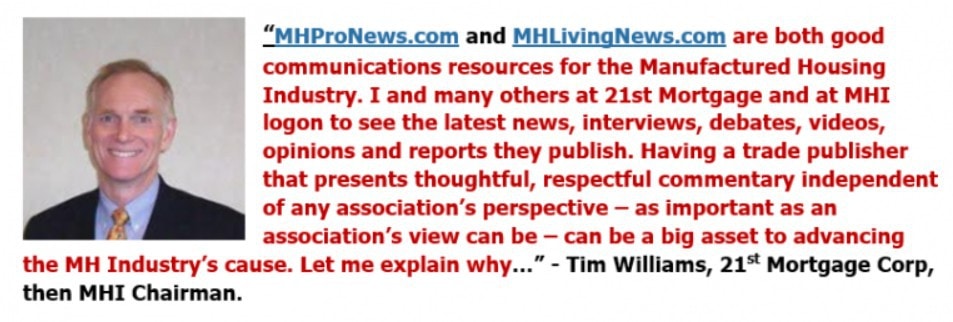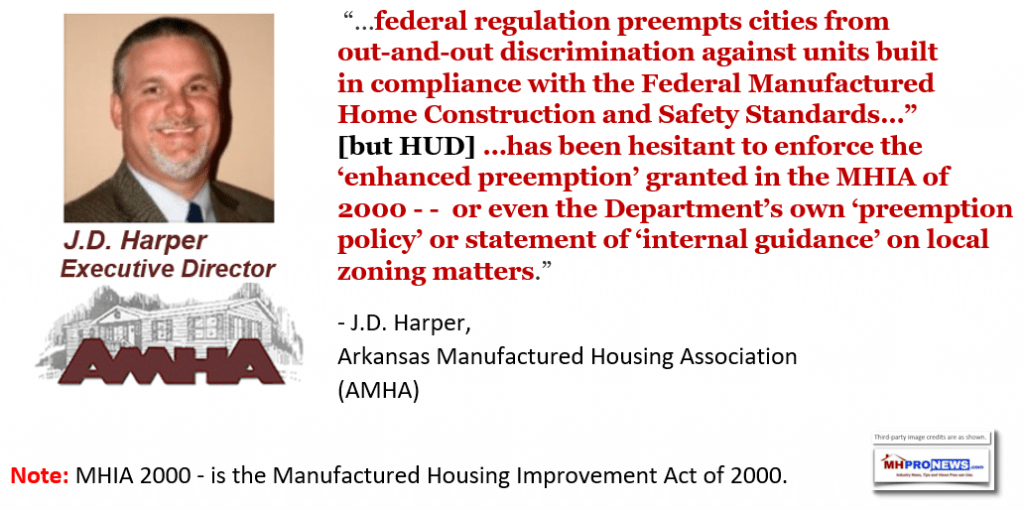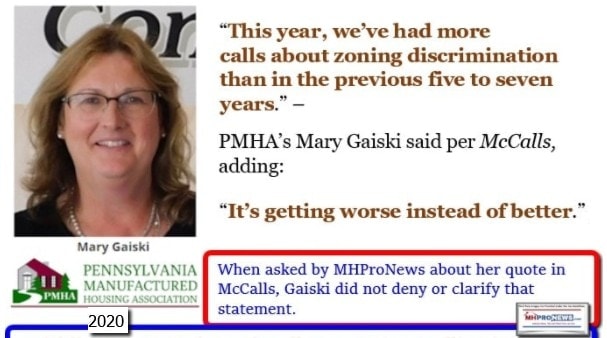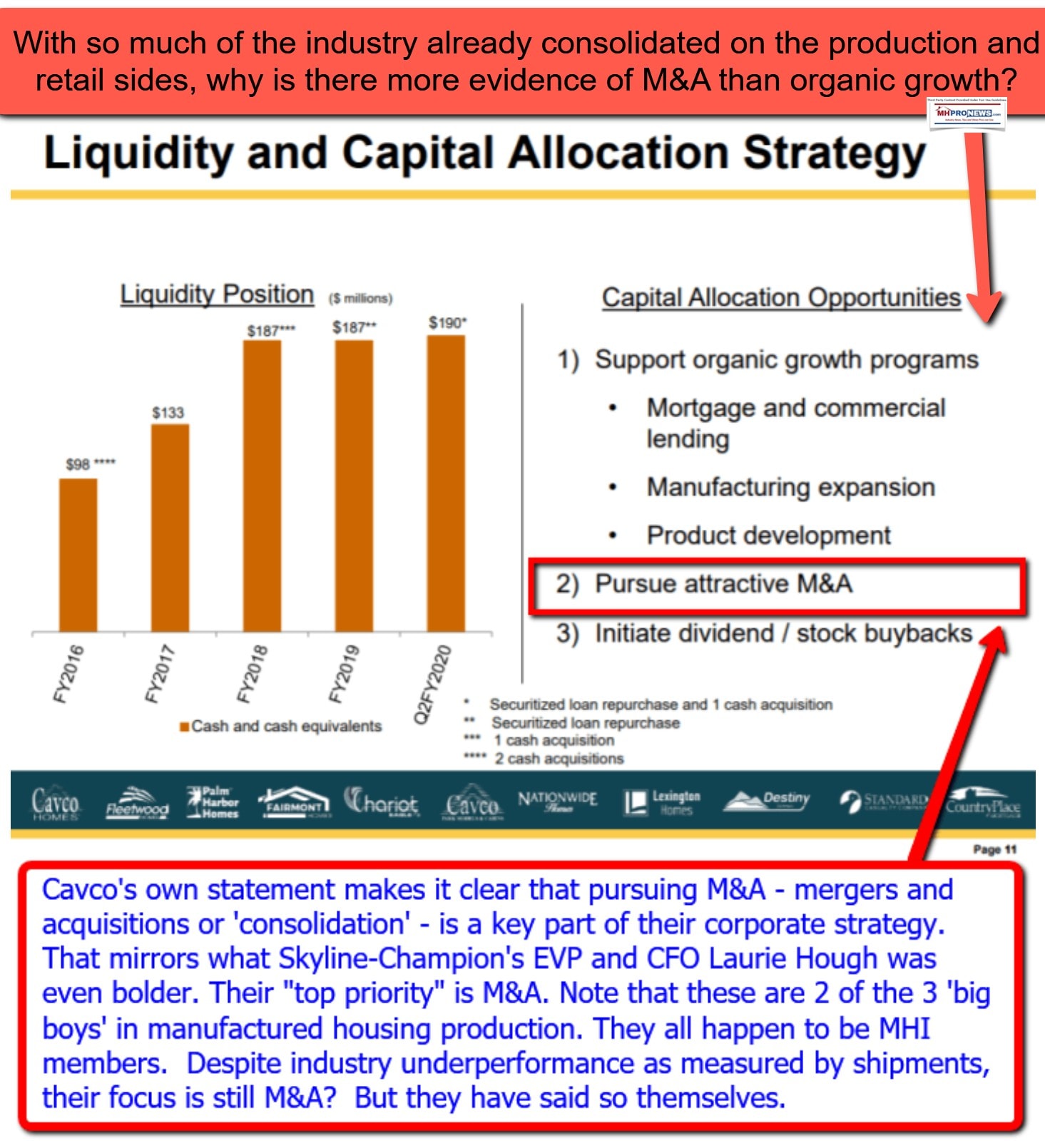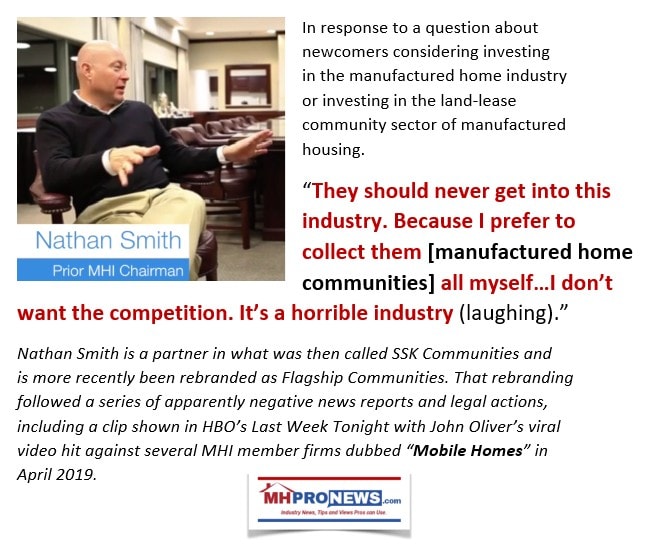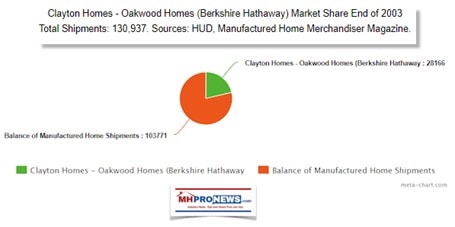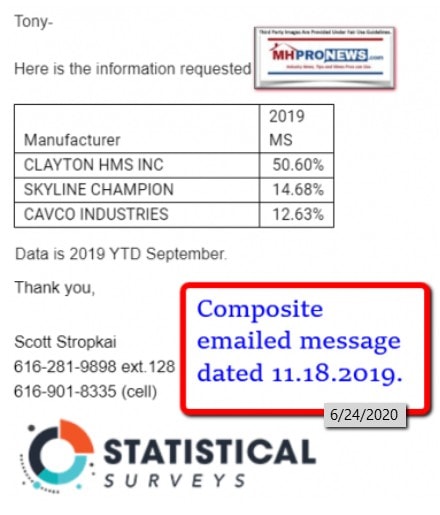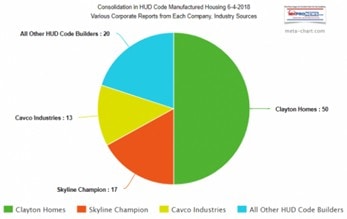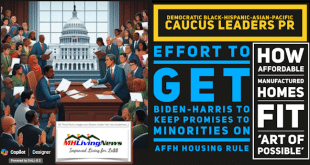The Private Equity Stakeholder Project (PESP) are among the nonprofits, media, and public officials who have called RHP Properties and other “consolidators” of land-lease manufactured home communities “predatory.” While such comments were once more commonly reserved to Democratic lawmakers, Republican officials have, in recent years, also become concerned that what is occurring in what for decades was “affordable housing” is now a serious issue in search of a solution.
To understand or ‘unpack’ the meaning of various statements, look at the problematic trends, and then consider possible solutions that are more than lip service, a series of facts, declarations, and evidence will be presented herein. Once that outline is laid out, pragmatic solutions based upon existing laws will be presented by MHLivingNews that should make good sense.
With that outline, this report and analysis will begin with the latest formal statements from RHP Properties and build from there.
Note that while this report would take the average reader about 20 minutes to read, it represents years of research and evidence. Put differently, reading this and digesting the contents carefully can save earnest truth-seekers years of headaches and heartaches that could provide rational solutions based on existing laws, instead of pie-in-the-sky in the great by-and-by promises that routinely never seem to come to pass.

Part I: Facts, Claims, and Evidence Relevant to Manufactured Home Living
Giant RHP Properties announced on April 30, 2021 their acquisition or buy of “29 manufactured home communities in Illinois, Indiana and Michigan containing more than 4,200 sites, for a purchase price of $184,000,000.” That is from RHP’s own press release. In a prior RHP news release on January 8, 2021 by Ross Partrich, RHP’s CEO, said: “RHP Properties, the nation’s largest privately held owner and operator of manufactured home communities providing affordable housing to families and seniors since 1988, announces the acquisition of nine manufactured home communities in 2020…Despite the Covid-19 pandemic, the RHP team was able to successfully add nine manufactured home communities to the portfolio, comprised of 2,200 sites and valued at approximately $152M.”
Per RHP, “This brings the company’s total of manufactured home communities to 297 nationwide.”
But they also seemingly want to assuage the concerns of those who think they may be “predatory.”
In yet another press release on December 18, 2020, they announced “RHP Properties, the nation’s largest private owner and operator of manufactured home communities, has announced a $10,000 donation to support an Illinois school through AdoptAClassroom.org.”
Doing the quick math based upon RHP’s own statements, they invested $336 million in acquisitions and $10,000 in charity. Or for every dollar given away, they spent $33,600 on buying new properties.
“RHP Properties is pleased to announce the purchase of the Heritage Portfolio. We are proud to be preserving affordable housing for more than 4,000 families,” said their CEO Partrich on April 30, 2021. “We also plan to improve these communities, including the addition of brand new homes.”
That phrasing of “preserving” affordable housing and the claim of “preventing mass evictions” was previously deployed by Havenpark Capital/Havenpark Communities according to the Des Moines Register on Jun 20, 2019. Similar statements have also been included in other media reports. The Iowa Capital Dispatch on February 17, 2021 cited a Havenpark spokesperson who doubled down on that statement that they are “preserving” affordable housing. But meanwhile, Havenpark’s site fee (lot rent) increases of 25-50 percent or more have been reported in Iowa and other states following acquisitions. Ancillary charges have also been passed onto residents who, in many cases, did not pay separate fees for water or other services before Havenpark’s takeover of a given community. It is worth mentioning that at least one Republican attorney general has explored the question if the mass evictions of residents are legal.
What else besides nomenclature, acquisitions, and charges of aggressive or “predatory” site fee hikes are in common between Havenpark and RHP? They have both been members of the Manufactured Housing Institute (MHI) for some years. So too are several other firms that have had similar claims made against them by their various communities’ residents and manufactured home resident advocates.
About 2 years ago, Mobile and Manufactured Home Living News (MHLivingNews) pointed out that the allegations made in the then viral HBO’s Last Week Tonight with John Oliver video had an interesting commonality. It seemed that most if not all of those firms named had clear ties to MHI. That included Berkshire Hathaway owned Clayton Homes and their lenders, who have also been described as “predatory” in their practices.
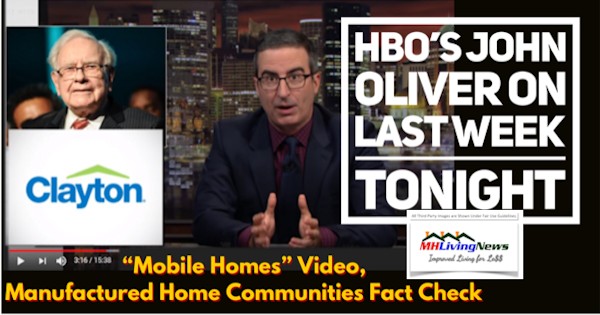
To better understand the dynamics, the following from the previously-shared perspectives of longtime manufactured homeowner and resident-leader Tim Sheahan is worth revisiting.

“As the [land-lease] communities filled with “im-mobile” homes, free market forces such as competition were lost and lot rents for captive homeowners skyrocketed in many areas of California.”
Note that while Sheahan was living in San Marcos, CA when he made these comments to the FHFA in testimony dated 3.21.2017, that pattern he described arguably exists in other parts of the U.S. too. Indeed, Sheahan has served as the National Manufactured Home Owners Association (NMHOA) elected volunteer president, and also on two other manufactured home community nonprofit groups. They are the Golden State Manufactured-Home Owners League (GSMOL) and the San Marcos Mobilehome Residents Association (SMMRA).
The point Sheahan and others have raised about mobile and manufactured homes being “im-mobile” is an important one. While they can routinely be moved, a key issue are total costs of moving from one home site to another. Beyond the cost of transportation, a variety of steps must occur to unhook a home from utilities, to prepare it for transportation, and once at its new location, to properly and safely reinstall it. Those total costs vary by region, complexity, permitting, utilities, uninstall and installation-related expenses. They total in the thousands of dollars. Common sums heard are some $5,000 for a single section (a.k.a. “single wide”) to $10,000 for a multi-sectional (a.k.a. “double wide”) homes.
MHI member Frank Rolfe, featured in John Oliver’s errantly named hit on the industry, knows these facts and has made it party of his “Mobile Home U” pitch to potential new investors in manufactured home communities.
In a comment Rolfe himself admits is “notorious,” he compared the situation of residents in a land lease to “like a Waffle House where the customers are chained to the booths.” While Rolfe has tried to walk that sidewise somewhat, he can’t reasonably escape that fact that he himself has doubled down and made it all the plainer. This quip by Rolfe to current and potential mobile and manufactured home community owners vividly illustrates that point.
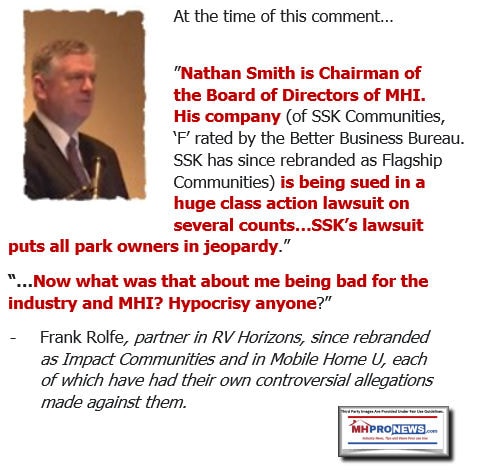
“If you like having a monopoly, holding all the cards, knowing the tenants won’t move their homes out, never worrying about someone building a new property near you and taking one of your tenants biggest assets if they default, then you are going to love mobile home parks.” The QCTimes on April 24, 2020 and others have cited that, including Rolfe himself.
The QCTimes also attributed to Rolfe: “Sure it sounds unfair. But there is nothing illegal about it.”
While being unfair is an understatement, that last point from Rolfe about it not being illegal may not be true. More on that further below and in linked reports.
As noted, several Democratic lawmakers, a growing number of Republicans, and other public officials have made this apparently growing trend of “predatory” behavior an issue. But thus far, the main ‘solutions’ posed have been various kinds of rent control to keep price hikes in line and propose or pass ‘right of first refusal laws.’ The later makes it possible for residents to organize and buy their own communities.
As a disclaimer, MHLivingNews’ editorial stance has evolved somewhat on this notion of rent control. It is reasonably reflected in the view of manufactured homeowner and community-resident leader, Robert E. “Bob” Van Cleef. “Initially, we will need some type of Space Rent Stabilization Ordinance to protect current residents of Manufactured Home Communities…”
Van Cleef strikes a note that aims to balance the free market while seeking to protect resident rights too. “We, as a community [of manufactured homeowner residents], cannot allow them [predatory owners] to [make residents] be made penniless and homeless because of the verbal promises made to them are not binding on the new owners [of a community]. We should explore sunset provisions, the use of rent controls…or similar methods to support the property owners, while protecting the residents.”
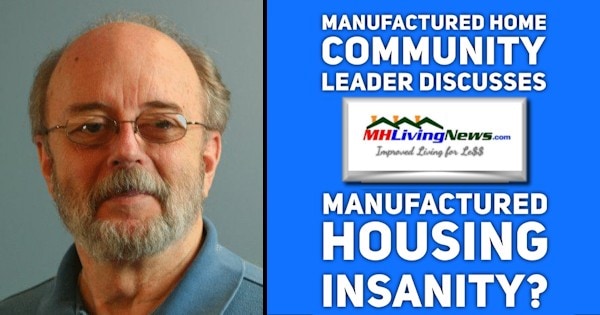
“One creative example is Florida’s Price Gouging Law,” said Van Cleef. “The goal being to restore the free market balance when the free market is rebuilt.” Florida’s price-gouging law applies in post-disaster events, such as hurricanes, which keeps price-gouging from occurring.
Those are some of the views of sober-minded residents who recognize the problems and are seeking fair solutions for all involved.
As residents in Delaware and New York State learned, rent control laws routinely have wiggle room. Not long after rent control was passed in New York, RHP Properties immediately challenged the law in a practical sense.
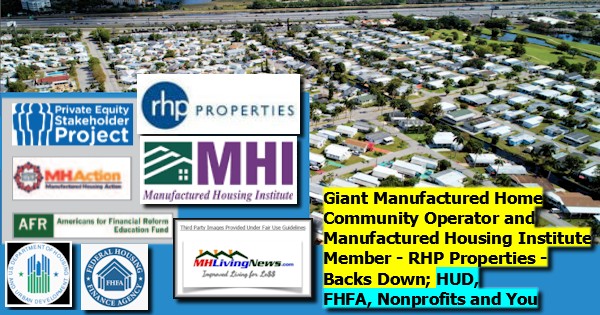
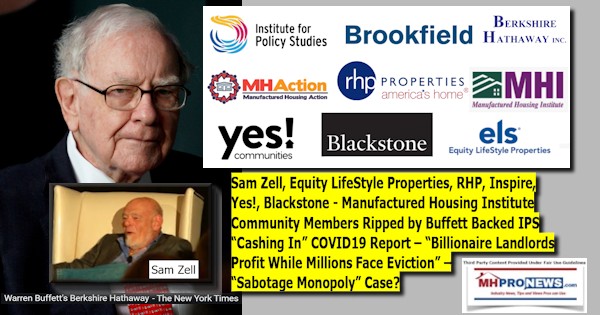
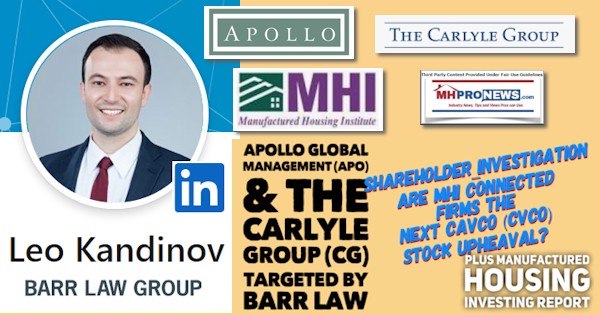
What RHP and other so-called predatory community operators should have taught all involved is that rent control is not a permeant fix. That was one reason why MHLivingNews had concerns over the use of rent control, because experience has shown that once rent control goes in, new developments tend to shut down. The two videos below illustrate that point. That patterns of the introduction of rent control leading to less new developing has been true in Canada and in the U.S., in both conventional housing, and in manufactured home communities too. It is one of the reasons that several Republican lawmakers have opposed rent control in the past.
The next video features an explanation from Nicole Gelinas of the Manhattan Institute on how rent control can harm those it is intended to help. It frames the issue more broadly than the CBC News video above. Note that both videos apply to issues on either side of the U.S.-Canada border.
What has arguably occurred in manufactured much of housing is a steady process of monopolization. Further and more specifically, it is the Warren Buffett style of slow-motion monopolization, deploying what Buffett and his partner Charlie Munger have repeatedly called a ‘castle and moat’ methodology that keeps competitors out. In deploying their “moat,” several things occur. In no specific order of importance are the following barriers that are arguably part of the moat process.
- Barriers of entry are established.
- Barriers of persistence are generated.
- Barriers for exit are created too.
Numbers of investors already get how the barriers of entry, persistence, and exit operate and how they can effectively manipulate a market.
Market manipulation itself can involve an antitrust and/or other legal violation. So, each of those need to be more broadly understood by the manufactured home residents, the general public, along with all sincere advocates, lawmakers, elected and appointed officials too.
With that backdrop, MHProNews and MHLivingNews have been raising the alarms on these issues for years. While our views have refined, the thrust has remained pro-consumer and in favor of authentic support for honest free enterprise, while clearly opposing those who are arguably harming the free market through market manipulation. That such market manipulation is occurring should not be doubted, as the quote below from Robin Harding, a self-proclaimed Buffett supporter, explained. Harding explained how he came to realize that Buffett was the killer of free markets and thus capitalism, not its savior.
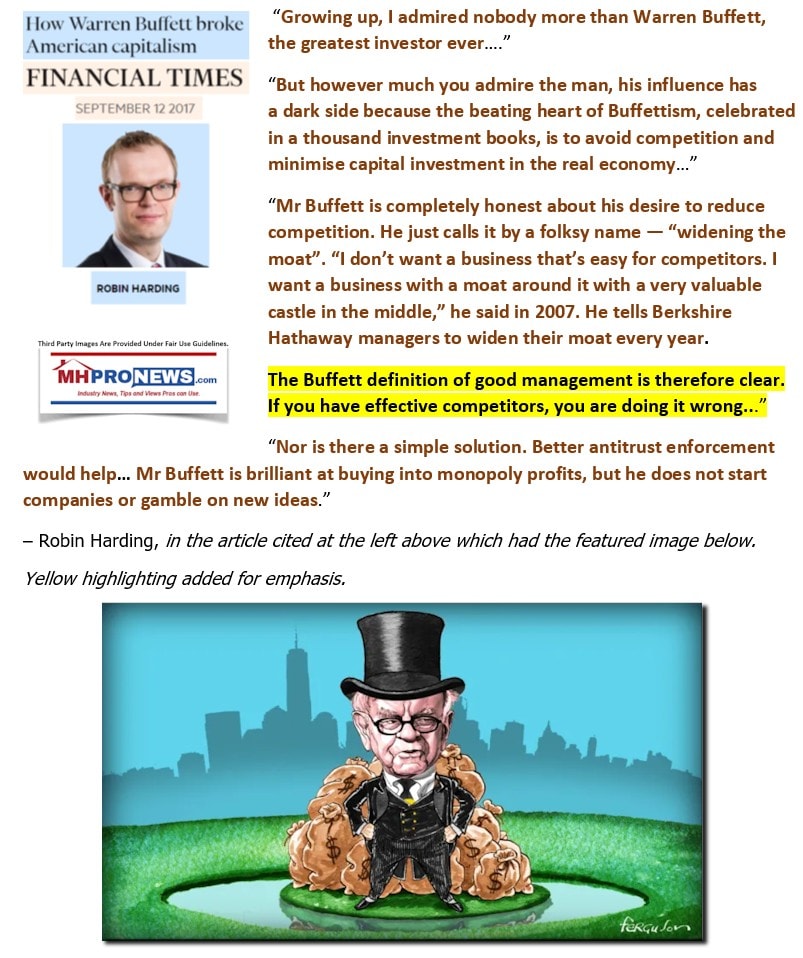
Ironically, Warren Buffett’s now longtime friend, business and nonprofit ally Bill Gates in a pithier statement, raised similar concerns to those raised by Harding. Said Gates, Buffett found weaknesses in markets that could be exploited. That process did not add value, Gates said, but rather was “parasitic.” Note the close relationship between being parasitic and predatory?
With those insights in mind, more recently, Samuel “Sam” Strommen at Knudson Law did legal research that confirms several of the concerns raised by our pro-ethical business and pro-consumer trade media platforms.
Strommen has called what is occurring in the manufactured housing industry “Rube Goldberg Machine of Human Suffering.” He specifically cited Berkshire Hathaway brands such as Clayton Homes, and their affiliated lending units, which are 21st Mortgage Corporation and Vanderbilt Mortgage and Finance (VMF). Strommen named MHI. He also cited concerns with the REITs or consolidators operating in manufactured housing.
Strommen cited various legal references and argued that what is occurring are “felony” antitrust violations, that may also include RICO and other law violations.
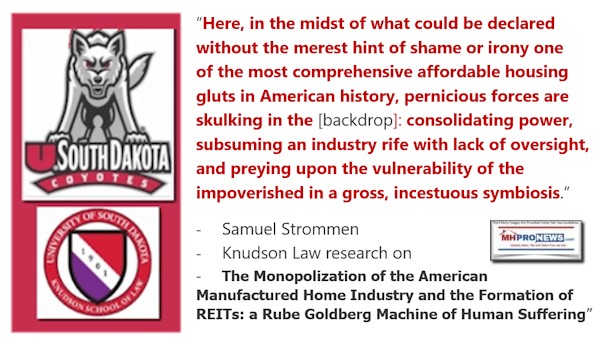
Given an opportunity to refute or otherwise respond to Strommen’s allegations, Berkshire Hathaway-connected attorneys and several of those involved in MHI remained silent.
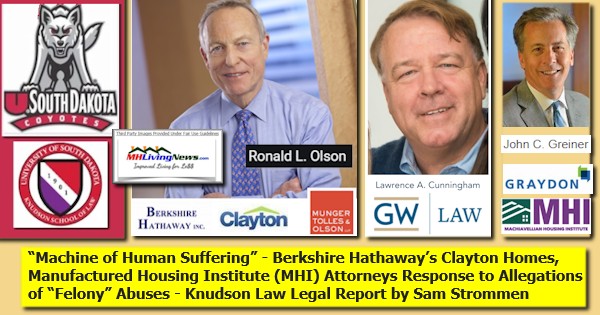
To frame the next section of this report, the following – which should not be construed as an editorially supported or favored political position, but rather as a claim to be tested and evaluated – is worth mentioning. In fact, it is not only worth mentioning, it has to be examined in order to grasp the next segment. These words are from the Biden campaign website.

“We the people.” Those words changed everything. Power rested in the people, not the government. Freedom to think, to speak, to act, to criticize your government, all protected. We became the model for the world. […] Our Constitution doesn’t begin with the phrase, “We the Democrats” or “We the Republicans.” And it certainly doesn’t begin with the phrase, “We the Donors.”
– Joe Biden, 2020 presidential campaign kickoff, May 18, 2019
Let’s sum the above up to this point. In no specific order of importance:
- Sheahan and others have observed that when the free market was properly operating, site fees in manufactured home communities were kept low through competition.
- The essence of the Buffett-Munger moat methodology, which is used by a growing number of firms in and beyond manufactured homes, aims to stifle competition and eliminate it. Berkshire owned Clayton Homes CEO Kevin Clayton said as much. So too did Warren Buffett.
- No rent control, heavy regulation, or other artificial constraints were needed when competition was properly operating. Further, while rent control may be useful as a stop-gap, it is not a long-term solution. In fact, the longer rent control is in place, the evidence suggests that it stifles the development and creation of new affordable housing options.
- Similarly, while conversions of existing manufactured home communities into ROCs or “resident owned communities” is proven to be useful as a move toward affordable site preservation, they are not creating new sites.
- In the absence of sufficient numbers of new sites and developments coming onto the market needed to support existing or potential affordable manufactured home owners, a similar upward pressure exists on site fees in land-lease communities that exists on conventional housing or apartments. Who says? It is the applied logic of Lawrence Yun, Ph.D. and chief economist for the National Association of Realtors. Prior HUD Secretary Ben Carson made a similar, and more manufactured home specific point that also explained how a healthy manufactured home market fosters household wealth formation for those with lower incomes, which includes minorities and people across the spectrum of backgrounds.
- As the complexity of the manufactured home industry – or other professions – caused by more regulations grows, that complexity of regulations favors larger firms over smaller ones. Regulatory complexity also fuels more exits, which benefits consolidators. More on that will follow in Part II.
Part II – Sun’s Gary Shiffman, ELS’ Marguerite Nader, MHI, et al…
With that backdrop from Part I above in mind, the quotes that follow from publicly traded Sun Communities Inc (SUI) Chairman and CEO Gary Shiffman, plus those from publicly traded Equity LifeStyle Properties (ELS) President and CEO Marguerite M. Nader will now shed added light on these prior, emerging, and looming trends. It should be noted that while these quotes are deemed relevant, citing a source should not be construed as an endorsement of all that a person has said or done, much less of the organization.
That said, there is a certain theoretical advantage to statements made by public firms. They are supposed to be accurate. If they are deliberately deceptive, then legal consequences may follow for the person and/or firm making a deceptive claim. As an example from outside of manufactured housing, Elon Musk made a statement via tweet that was deemed deceptive. He was fined some $20 million dollars for having done that.

So, looking at public statements by publicly traded firms has a unique value in such research.
With those notions in mind, let’s consider that Shiffman previously said that Sun can often establish a new manufactured home community for less than what it costs to acquire an existing one.
That statement by Shiffman should be considered with the research cited below by a bipartisan panel of lawmakers. They determined that manufactured homes and new manufactured home sites were generally significantly less costly than developing multi-family housing.
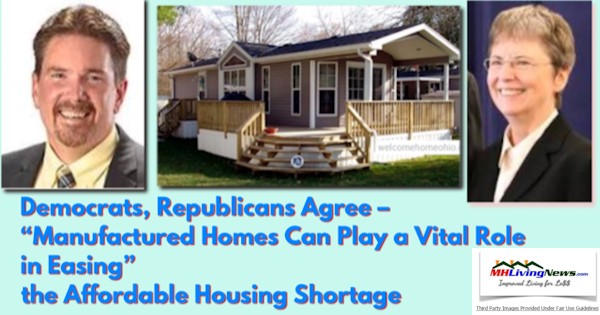
Those lawmakers cited above, in the wake of their research, said that preserving manufactured home communities was far less costly than preserving an apartment building or other multifamily housing.
So, when it comes to affordable housing, with perhaps the notable exception of a larger high-rise multifamily development in an inner urban area where land costs are much higher, manufactured homes and manufactured homesites are generally significantly less expensive. It is ‘more affordable.’
It is in that context that Shiffman saying they can develop new communities in several cases for less than the costs of current properties takes on a new light.
Shiffman’s and those lawmakers’ reasoning, the self-promoting Rolfe made the outrageous argument than ‘no one should ever build a new mobile home park again.’ While routinely using the wrong terminology about this part of the affordable housing market, the case can be made that Rolfe also advocates concepts that are contrary to the interests of tens of millions of Americans.
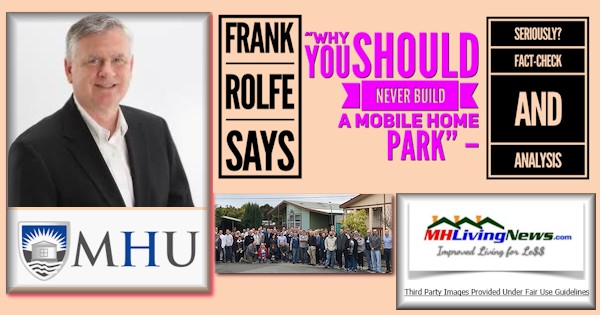
Why would Rolfe, who along with his partner Dave Reynolds are clearly intelligent, make such an argument?
The answer is explained in depth in the report linked above. But the short version is simply that it benefits their short-term interests, not those of society in general, much less the interests of manufactured home residents or new affordable housing seekers.
Next, here is a key pull-quote from Shiffman’s recent Sun Q1 2021 earning’s call.

~ Gary A. Shiffman — Chairman and Chief Executive Officer (CEO), emphasis added by MHProNews. Apr 27, 2021, Q1 2021 Earnings Call, available on Motley Fool and MHProNews.
Put differently, Shiffman has revealed how fear of higher taxes and more regulations are being used as a barrier of persistence that are driving more selling by manufactured home community independents, as well as others.
That pressure and fear over the significant potential loss of the value that mom and pop community operators might incur in their property(ies)’ value, says Shiffman, are sparked by the Biden pledge of higher taxes also benefits consolidators. So, when pondering that pull quote above from the Biden campaign site, objective minds must realize that words are not always what they seem to mean.
Let’s note that Shiffman is arguably correct when he says that there is a serious lack of accurate information about many data points regarding manufactured home communities. Here is how he phrased it. As part of his firm’s most recent earnings call, Shiffman said that: “unfortunately, there is not a national repository of information or indexes and the related items to manufactured housing communities as you’re referencing them.”
That is either a slam on MHI and/or an insightful revelation to some. Why? Because MHI claims to do research in support of the industry. If so, then why has MHI – in all their decades of existence – failed to create such an accurate and reliable national repository of information on manufactured home communities?
Sadly, when MHI does ‘research’ or ‘focus groups’ they oddly provide only the information they opt to share, and hide the reset behind paywalls. That means, in practice, the their claims cannot be properly unpacked. Indeed, despite some of MHI’s published ‘research’ claims, they have later proven by experience to be arguably misleading if not deliberately false.
Furthermore, MHI does not have a collection of third-party research, such as MHLivingNews and MHProNews have been establishing for years. Why is that important? Because as the President and CEO of the Manufactured Housing Association for Regulatory Reform, Mark Weiss, J.D., has aptly noted, facts are stubborn things. Facts, evidence, accurate quotes in context, and trends are absolutely necessary for understanding and exposing what has occurred that has for decades hobbled manufactured housing.
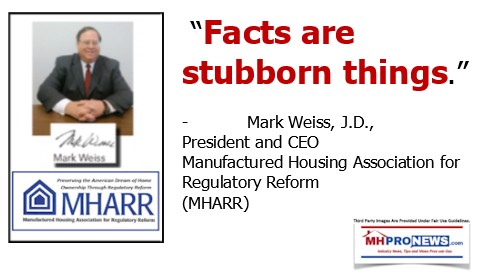
To Shiffman’s point of the industry not having a national repository of accurate information, how does that impact the dynamics being explored in this report? Because a lack of accurate information and proper understanding are useful to consolidators. Says who? Actor Danny Glover in the award-winning documentary Shadows of Liberty, where he said that media is part of the monopoly on information and money (capital, or access to capital).
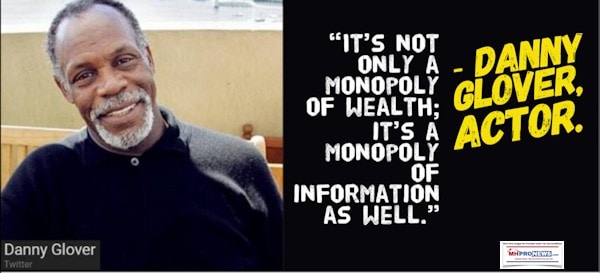
Glover is of particular interest in other ways, because he has served for some time on a board of a nonprofit funded by Warren Buffett.
So, the cloud of misinformation or contradictory claims are part of the problem. That is why evidence-based reports that cite facts and accurate quote sources – such as this one – are a necessary part of the solution.
Next, consider the following useful pull-quotes.
Here is were the insights of Carol Roth and the famous quotes below must be kept in mind.
Then consider the following quote from Marguerite Nader at ELS as it relates to the rent control topic.
So, Nader confirmed to ELS investors that rent control is something they can navigate and use to their own benefit. Nader also called MHI “their” association.
Indeed, MHI’s larger firms demonstrably dominate that trade group. The case can be made that the smaller firms exist as fodder for acquisitions that are in the meantime paying dues that benefit the larger firms that dominate the trade group.
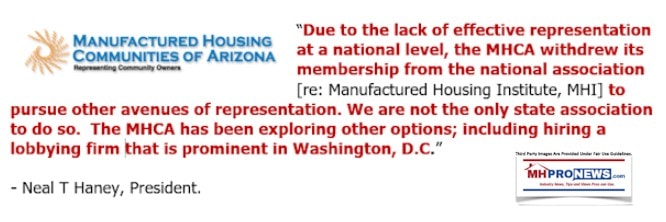
A similar claim can be made about some of the state associations.
Part III – How Do Industry Professional React to the Above Claims?
“You seem to be trying to write a manufactured housing newsletter, but it is poorly written and is gibberish with acronyms that I don’t understand. Please remove my email from your list. I appreciate industry news, but prefer to read things that are coherent.” – Michael O’Connor. O’Connor is listed by Open Corporate as an agent for “ANNAPOLIS ACQUISITION LLC.” His email address suggests a connection to that firm too. Does that sound like the comment above is a complaint from a consolidator?
Frank Rolfe’s partner Dave Reynolds recently sent this email to our publication and mainstream media in response to an exposé of their so-called “Impact Cares” nonprofit.
It is clear from your emails that you have a pre-determined agenda and view point, which will not change no matter what I say. The fact that you are attempting to spin Impact Cares events–which have been helping literally hundreds of people have a better quality of life and which I pay for out of my own pocket–into something negative, leads me to unfortunately conclude that, in my opinion, you do not appear to be operating in good faith and, instead, solely intend to defame me and otherwise spread inaccurate, harmful information about me. In light of that, I do not believe any further dialogue would be productive.
Thanks
…
Dave Reynolds
Impact Communities
Impact Cares”
Rather than engage on substance, facts, or logic – some people engage in name calling and deflection. These are known as logical fallacies or debating tools used by those who do not have a good reply that is based upon the facts and evidence.

What is clear is that for years, as pro-manufactured housing professionals, numbers of MHI leaders praised our work.
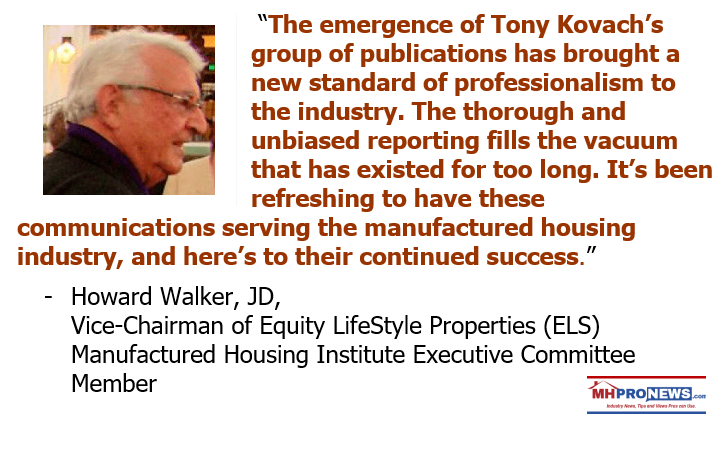
But as our evidence-based reporting, fact-checks, and analysis here on MHLivingNews and on MHProNews began to unravel what previously seemed like mysteries behind years of manufactured home industry underperformance and problematic patterns, those words of praise from MHI and their leaders often went silent.
But there are still outbreaks of periodic praise, even from rivals who arguably hate our guts.
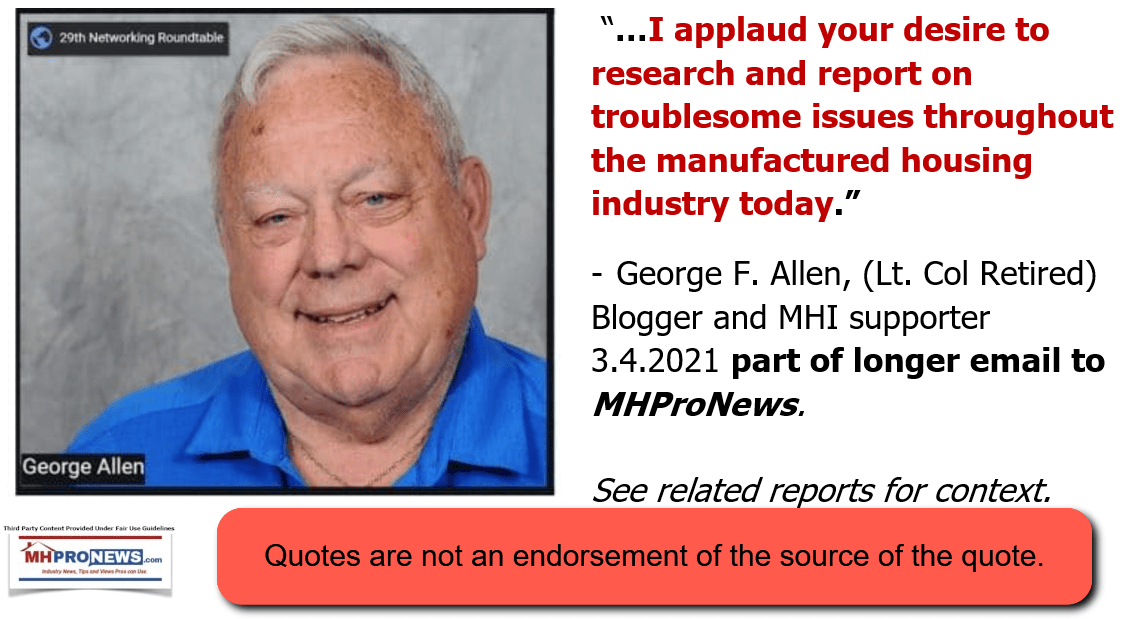
While some at MHI jeer our reports, others there and beyond cheer. A similar patterns exists among those who are trying to run white hat operations, as well as among manufactured home residents who see the value of evidence-based reporting. It must be noted that some at MHI, as well as some company insiders within so-called predatory firms and affiliates, have been sources for useful tips.
Perhaps like RHP’s donation to a charity, Impact Cares, or certain donations by Clayton Homes and others are arguably a combination of tax shelter that act as a marketing tool while seeking to deflect from problematic claims about Frank and Dave that MHProNews, MHLivingNews, MHARR, and others have been exposing. Berkshire’s Buffett gives away money too. But if that is examined, it is often much like what Warren Buffett’s son Peter has admitted about philanthro feudalism. Some give away money that changes nothing for the better.
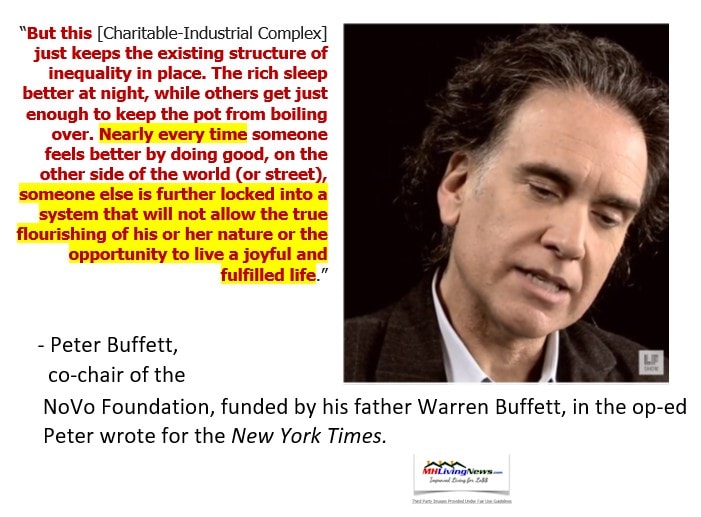
As some of our prior reports reflect, they may posture or provide useful information and insights, but at the same time are pushing ‘solutions’ that actually aid consolidators.

There are too many quotes to choose from that demonstrate that numbers of professionals, often those connected to MHI and/or a state affiliates of theirs, are working to undermine the industry as they strive to consolidate it. Some of these are oblique, as are shown by the examples below. Others are more pointed as in the case of the Marty Lavin, J.D., statement and Neal Haney statements shown above. A few screen captures from public documents and pull quotes will serve to illustrate.
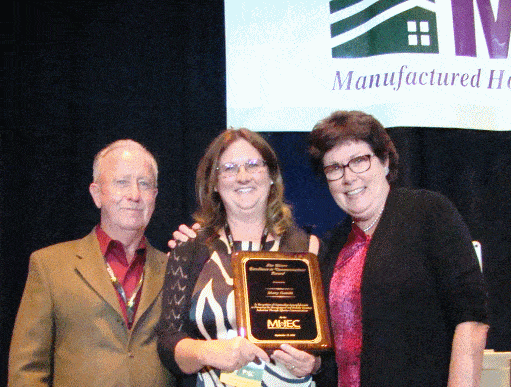
Consolidations. The pattern of consolidation activity for years since the start of the Berkshire Hathaway era in manufactured housing is readily demonstrated.
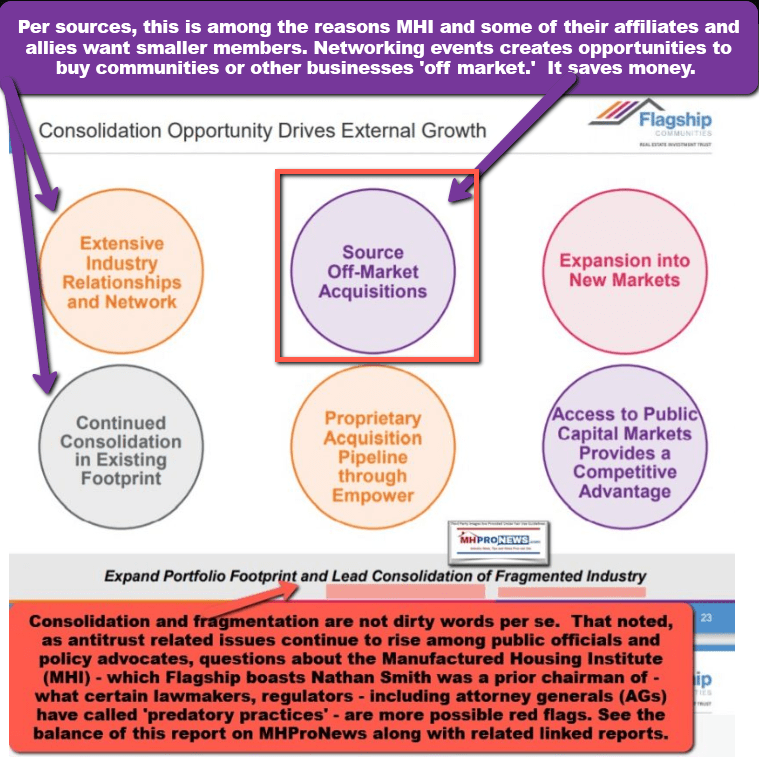
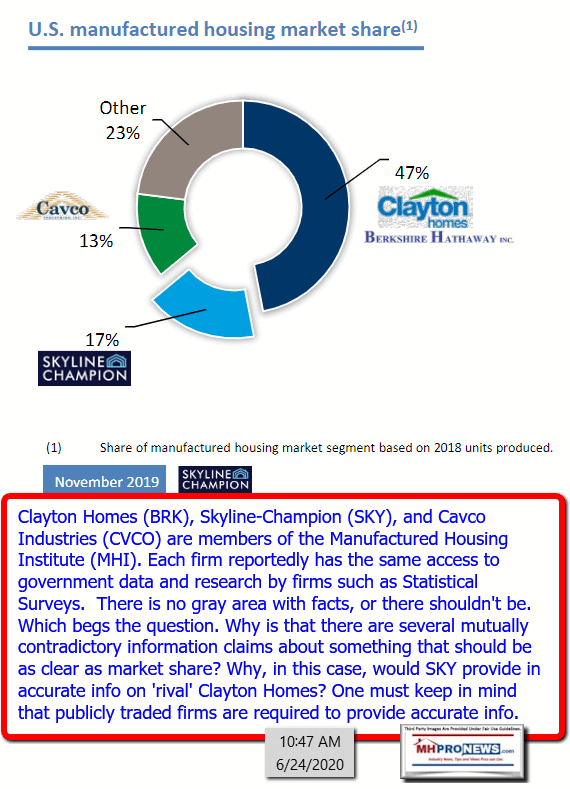
It should be stressed, for newcomers here, that despite the significant volume of negative news generated by companies like those named herein, there are independents who routinely have good relationships with their residents and consumers. These are what we refer to as “white hats” vs. “black hat” operators. This focus group below illustrates that point, as does the report that is linked under it.
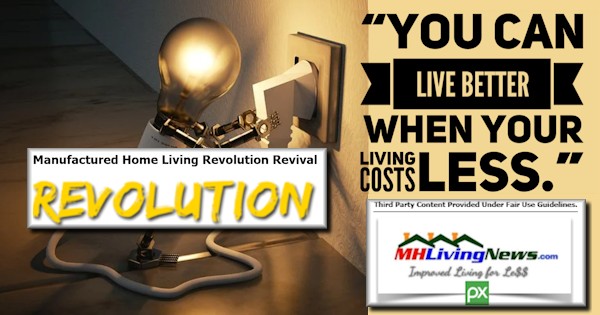
IV Additional Information, Summing Up, and Conclusions
In no particular order of importance:
- There are decades of third-party research that demonstrates the value of modern manufactured homes in solving the affordable housing crisis. Once properly unpacked, that third-party research routinely debunks the vast majority of concerns raised by the public or officials about manufactured home living. Oddly, MHLivingNews – not MHI – is the runaway better source for finding such information, as MHI routinely has none of this found or accessible from their own website. A similar claim could be made about those major firms behind MHI. If they wanted positive information about their profession to be widely known, why don’t they make it available?
- For years, much of the most troubling reports of problematic behavior within manufactured housing is from MHI-member firms and/or some of their state association affiliates. Sources tell MHLivingNews that MHI has not yet called into question those problematic behaviors, despite their so-called “code of ethical conduct.”
- Many in the industry, as in politics, demonstrably use window-dressing to help provide cover for arguably problematic behavior.
- Why is lending being restricted in ways that harm manufactured homeowners? Ask the FHFA. When this writer delivered a scathing evidence-based public rebuke in 2019 at two of their so-called “Listening Sessions,” they took that chastisement in silence.
- More recently, when this writer sharped those evidence-based rebukes and calls to enforce the law, FHFA cut me off from finishing my presentation. While they have since offered to post a video that would include my comments, they have thus far refused to admit that they are engaging in what is arguably a de facto coverup. Until some of those issues are resolved in writing, we have agreed to consider the make-up video so long as the FHFA agrees make the other needed corrections to their now arguably flawed public record. This is NOT the transparency that the Biden-Harris team claimed they would bring to Washington.
- In the only serious public debate of these issues to date, MHI member Andy Gedo made several useful admissions before throwing in the towel.
- Gedo’s admissions served to confirm what MHLivingNews has reported for some years. Namely, that there is a moat-method being used to slowly monopolize the industry. Who says? Kevin Clayton and Warren Buffett, among others.
- While politicians may say they want to help on this or that issue, the case can be made that all that they need to do is properly probe such allegations as are shown or linked from this report. Then, in the light of the facts – which will arguably confirm the years of evidence compiled here and on MHProNews – they should press for a full enforcement of the law.
- There are voices across the left and right or – from Democrats, Independents, and Republicans – that are using similar evidence-based arguments to expose the corruption that exists between big business, big government, and too many politicos.
- MHLivingNews reported years ago that the solution to the affordable housing crisis is hiding in plain sight. But sadly, forces inside and outside of our profession have throttled it for their own profit and gains.
- Antitrust, RICO, and other laws that prohibit market manipulation, along with the Hobbs Act, are among those that could arguably be used to break up and legally punish the predatory behavior of those who fill the bill. Doing so has the advantage of encouraging and thus keeping honest and ethical businesses. In the absence of appropriate legal action, bad behavior is only being de facto encouraged.
- Developing more sites and the financing to make that possible already has the laws needed to support them. The Manufactured Housing Improvement Act of 2000 and the Duty to Serve Manufactured Housing (DTS) found in the Housing and Economic Recovery Act of 2008 (HERA) are just two of the prime examples of how the status quo could be changed by using existing laws.
As Senators Elizabeth Warren (MA-D), Bernie Sanders (MA-Democratic Socialist, caucuses with Democrats) and 45th President of the United States (POTUS) Donald J. Trump have both said, the system is rigged. That statement is true, as the above reflects. But merely saying that “the system is rigged” is not in itself a solution.
The corruption must be exposed, understood, and then dealt with legally. The information found and linked from this report is a strong starting point for those who may have been previously unclear about the nuances and dynamics occurring in this industry.
Sharing this report, and then asking public officials to take authentic action are the proper next steps.
As a closing thought, there are some in both major parties that are calling for new laws. Those may or may not be useful. What the above and what is linked from this report demonstrates is that the laws needed to press these issues already exists.
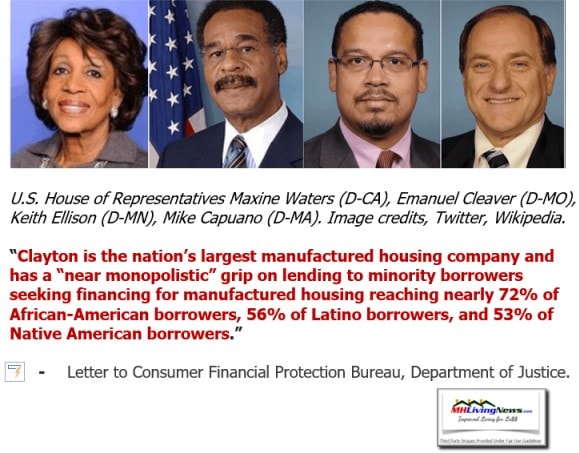
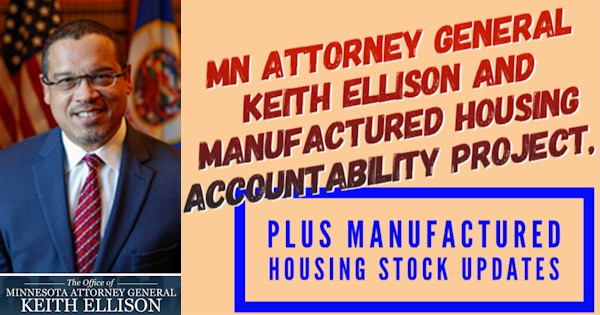
Because Congress passed the laws years ago to fix these issues. Those laws were enacted with widely bipartisan support, as the evidence-based and hot-linked listening session comments linked here and here on the FHFA website each make clear. Learn and Understand the facts. Share the facts. Press for full and proper law enforcement.
Candidate Biden, in that quote further above, said he would not be beholding to the donor class. But the evidence is sadly already suggesting otherwise. Says who? In some cases, other Democrats.

People of good will from either major party, or those with no political affiliations at all, can be part of the fix of what has gone terribly wrong. This report could be boiled down to these points. Proper understanding of the facts and evidence. Proper sharing of the facts, evidence, and what the trends reveal. Proper investigations and then robust legal action. And don’t let misleading claims or fancy words distract you from years of corrupt behavior that must be stopped. Failure to address these trends and purportedly predatory practices will logically only result in more consolidations and thus more of the same in the days ahead. Freedom is never free. Freedom and justice always comes at the cost of intelligent effort. ##
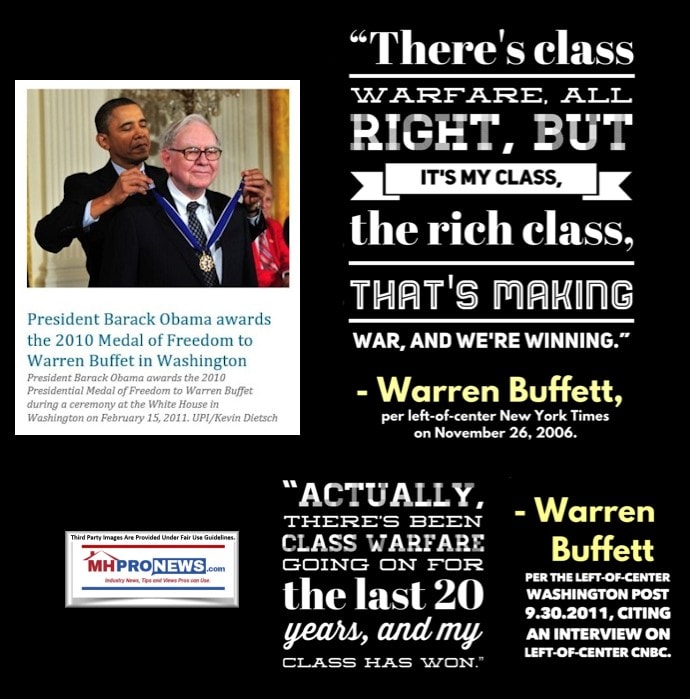
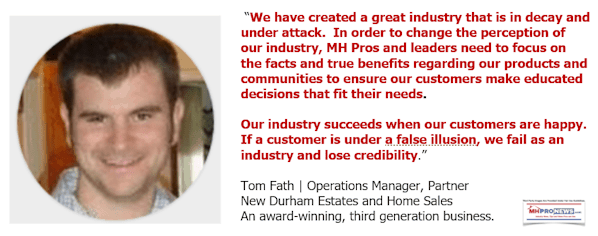


That’s a wrap on this installment of “News through the lens of manufactured homes and factory-built housing” © where “We Provide, You Decide.” © ## (Affordable housing, manufactured homes, reports, fact-checks, analysis, and commentary. Third-party images or content are provided under fair use guidelines for media.) (See Related Reports, further below. Text/image boxes often are hot-linked to other reports that can be access by clicking on them.)

By L.A. “Tony” Kovach – for MHLivingNews.com.
Tony earned a journalism scholarship and earned numerous awards in history and in manufactured housing. For example, he earned the prestigious Lottinville Award in history from the University of Oklahoma, where he studied history and business management. He’s a managing member and co-founder of LifeStyle Factory Homes, LLC, the parent company to MHProNews, and MHLivingNews.com. This article reflects the LLC’s and/or the writer’s position, and may or may not reflect the views of sponsors or supporters.
Connect on LinkedIn: http://www.linkedin.com/in/latonykovach
Recent and Related Reports:
The text/image boxes below are linked to other reports, which can be accessed by clicking on them.
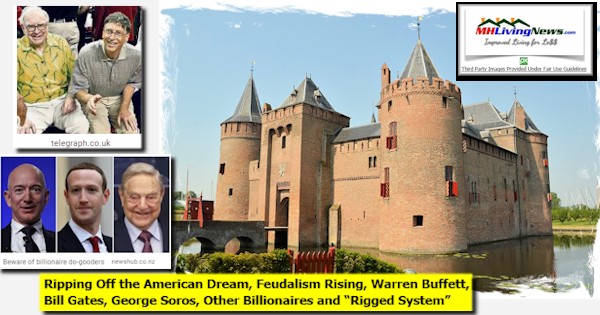

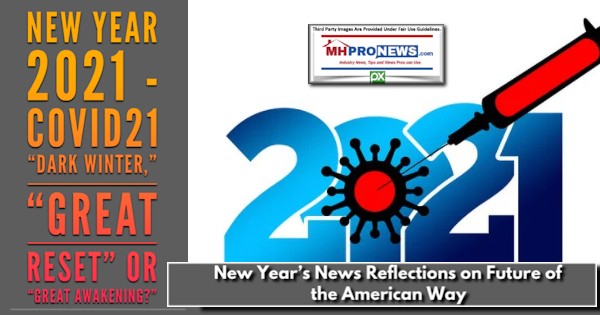
 manufacturedhomelivingnews.com Manufactured Home Living News
manufacturedhomelivingnews.com Manufactured Home Living News

![DidntWantToMeetWarren[Buffett]BecauseGuyBuysSellsFoundImperfectMarketNotValueAddSocietyZeroSumGameParasiticBillGatesPhotoMicrosoftLogoGatesFoundationLogoQuoteQuotableQuoteMHproNews](http://www.manufacturedhomepronews.com/wp-content/uploads/2020/07/DidntWantToMeetWarrenBuffettBecauseGuyBuysSellsFoundImperfectMarketNotValueAddSocietyZeroSumGameParasiticBillGatesPhotoMicrosoftLogoGatesFoundationLogoQuoteQuotableQuoteMHproNews.jpg)
